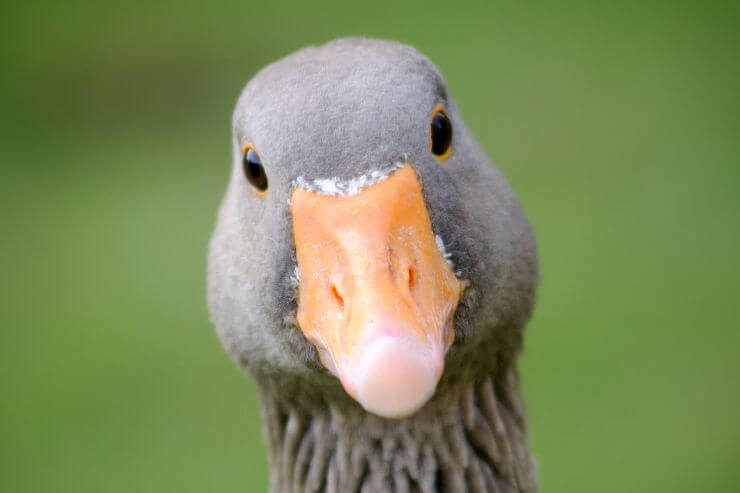Geese are a diverse group of waterfowl, with various species distributed throughout the world. Geese are a common bird for birdwatchers to enjoy, with interesting behaviors (although they’re often territorial). They’re also kept in captivity both as livestock (used for meat, feathers, and eggs) and as pets – their noisy calls and territorial behavior can sometimes make them great watchdogs!
Some love them, and some hate them due to their noisy, territorial personalities around breeding season. But, if you’re looking to keep geese – or if you’re simply interested in their lives & behavior – you may find yourself wondering how long geese live on average. We’re here to give you a better understanding of a goose’s life, and how you can help geese live to the maximum end of their lifespan!
How Long Do Geese Live?
When you’re looking into how long geese live, it’s important to consider two factors – species and domestication. Geese are medium-sized members of the waterfowl family, Anatidae; they can be from either genera Anser or Branta. There are many different species of wild goose; their lifespans vary by species, and wild geese typically live shorter lives in general than domestic geese, due to threats from predators, lack of available food and other challenges domestic birds rarely face.
The Canada goose, the world’s most populous goose species and one of the most widespread birds in the world, has a lifespan of 10-24 years in the wild; however, the mortality rate for juvenile Canada geese is very high, meaning that many geese don’t make it to adulthood at all, let alone for multiple decades.

While it’s tough for juvenile geese to make it, with the odds stacked against them, many geese can live upwards of 10+ years in adulthood. The snow goose, another fairly common goose species, has an average lifespan of 6 years in the wild, but they can frequently live much longer, with many snow geese reaching 10-25 years of age; some individuals have even been reported to live upwards of thirty years. Typically, though, young goslings are claimed by predators – the struggle to make it to adulthood is incredibly difficult for the young, vulnerable birds, even with the defense of their parents.
Domestic geese, without the hardships of wild living & with proper care, can live much longer than their wild counterparts. For example, the Canada goose mentioned above could live much longer in captivity – the oldest recorded Canada goose, named George, was documented to live 49 years, 8 months.
Domestic geese, such as the Chinese goose, can live upwards of 20 years easily with proper care. In general, these birds live longer not because they are inherently healthier, but because they are protected from many of the risks to health that wild birds are exposed to.
Healthier Geese Live Longer – How to Help Them
There are things you can do to hopefully improve the lifespan of the waterfowl near you, or the lifespan of any geese you may own. While unfortunately, the circle of life continues on, it’s possible to give geese long, happy lives with proper care.

When feeding wild geese, use caution and respect any signs put up in the vicinity. Many bird lovers don’t realize that feeding geese in public parks or other areas can actually be detrimental to their health. Feeding them bread, a common food choice for wild birds, is unhealthy; over time, frequently feeding bread can cause geese and other waterfowl to develop a condition called ‘angel wing’ that prevents them from being able to fly.
Unhealthy food can also cause obesity as well as other health issues from improper nutrition. Healthy foods that you can offer geese (if feeding them is not prohibited) include peas, rolled oats, and waterfowl diets specifically formulated to give them all the nutrients they need.
When keeping pet geese, much of the same applies. Offer your geese a specially formulated diet, along with healthy treats like vegetables to diversify what they eat. Ensure any area the geese will be kept is as predator-proof as possible; young goslings are particularly vulnerable to predators like hawks and snakes. Offer your geese yearly veterinary checkups, like you would do for a cat or dog, to catch any health issues before they get worse.

You can also support your local geese in living happy, healthy lives by working towards a healthy ecosystem. Don’t litter or leave items in public areas; if you feel up to it, participate in cleaning up trash where your local waterfowl live. If you walk your dog in public parks, clean up after them to prevent pollution in your waterways. Protecting the areas geese inhabit will help them thrive without human intervention!
Conclusion
You may be surprised to know that the geese you see swimming in public ponds and sometimes being a nuisance towards anyone with food are actually long-lived birds that can keep going for multiple decades. While sadly, the goslings you see each spring have a tough journey ahead, with many not surviving until adulthood, it’s still possible for geese to survive upwards of twenty years in the wild.
Great news if you’re a goose lover – if you find them to be pests in your neighborhood, you may have a long wait ahead of you! Support your local geese by advocating for clean habitats, and by providing healthy food, and you’ll be rewarded with hours of fun watching them swim and dabble.
